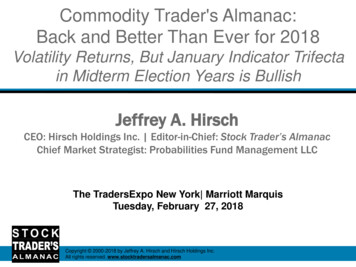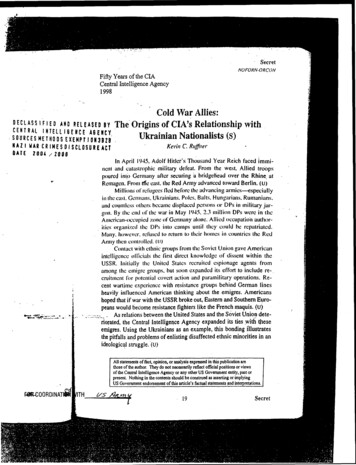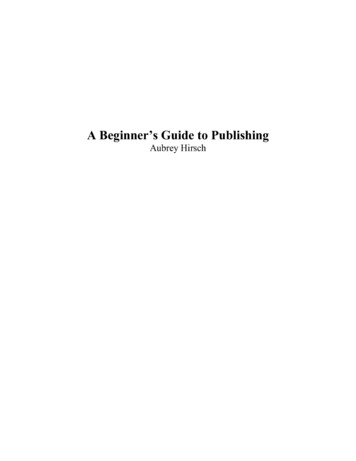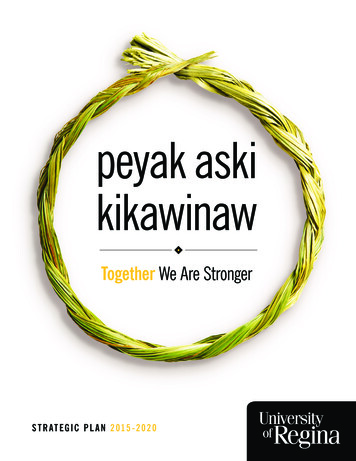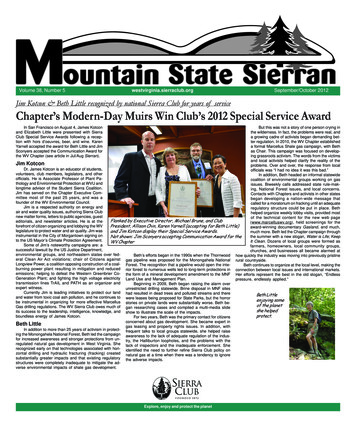
Transcription
REGINA M. HIRSCH1535 Observatory Drive, Madison, WI 53706(608) 335-7755rmhirsch@wisc.eduEDUCATION:Ph.D. Department of Wildlife Ecology. University of Wisconsin Madison. 2002. Minor: Entomology.Dissertation: Birds, Frogs, And Farmers: A Community-Based Mitigation Project.Advisor: Dr. Stanley A. TempleM.S. School of Forestry and Environmental Studies. Yale University. 1990. Concentration:Conservation Biology.Thesis: Choice of artificial nest structures by the endangered yellow-shouldered blackbird, Agelaiusxanthomus.Advisor: Dr. Steven R. BeissingerB.S.College of Letters and Science. University of Wisconsin Madison. 1984. Major: Psychology.Senior Thesis: The impact on different social settings on behavioral development in infant rhesusmonkeys.Advisors: Dr. Stephen J. Suomi and Dr. J. Dee HigleyCERTIFICATES:Permaculture Design Course (Madison Permaculture Guild. 2013); Kundalini Yoga Instructor Training(Kundalini Research Institute, 2013); Project Management Planning, Scheduling and Control (UWExecutive Education and Wisconsin School of Business, 2009).SKILLS: Program Management: Experience managing multiple projects simultaneously, doing budgeting andaccounting, reporting, identifying and coordinating team members, facilitating team meetings, anddeveloping action plans and timelines.Writing: Published articles for a variety of publications.Fund Development: Identified potential funding sources and successfully received 2.2 million.PROFESSIONAL EXPERIENCE:University of WI Madison, Center for Integrated Agricultural SystemsMadison, WIAssociate Scientist (Part-time)September 2020 - Present Hard Cider Project – organize and facilitate meetings with cider makers and conduct surveys ofcider maker distributors and retailers, review, write, and edit journal articles. Grassland 2.0 Project – representative on two committees: policy and markets to promote grassfed livestock, sustainable farming practices, equity, and conservation. LFPP Project – organize meetings with both Food Hub and Madison Food Terminal, grantwriting. Hazelnut Project – develop cluster network of growers, organize network meetings andtrainings, and organize meetings with Hazelnut project collaborators.Advanced Engines Development CorporationMilwaukee, WIVice-President of Operations (2018-present) andJune 2007 – PresentDirector of Strategy and Planning (2007-2018) (Part-time & Full-time) Project management of existing projects, and commercialization of finished projects. Build customerrelations through effective communications.
Hirsch, Page 2 Organize and facilitate strategic planning meetings for new and existing research projects, proposals,and company future goals.Research and co-wrote technical proposals for new and existing projects with Federal, State, PrivateCompanies, and Investors for new fuel-efficient engines.Research policies on engine and vehicle emissions.Negotiate contracts and manage all financial aspects of contracts and business and analyze budgetsand expenditures for contracts wrote reports and presentations.R.M. Hirsch Environmental Consulting, LLCStoughton, WIConsultant and EducatorMarch 2004 – Present Work with Wisconsin Academy of Sciences, Arts & Letters to evaluate their Climate and Energyprogram by developing and analyzing an on-line survey and conducting phone interviews of keyparticipants. Co-create, conduct, and market continuing education workshops with other educators on nativepollinator conservation and designing edible landscapes using permaculture and forest gardenprinciples and practices. Work with IPM Institute and American Farmland Trust to design and promote their BestManagement Practice Programs to farmers for reducing nutrient loss and tillage practices. Work with IPM Institute, state and local partners to change NRCS program policy to includeIntegrated Pest Management in Ohio and Minnesota.University of WI Madison, Center for Integrated Agricultural SystemsMadison, WIOutreach Specialist (Part-time)April 2006 – Dec. 2014 Expanded the Eco-Fruit program from 12 Wisconsin farmers to over 100 in the upper Midweststates: provided educational opportunities and farmer led research in orchards and vineyards. Successfully changed NRCS policy on pest management incentive programs in WI. Collaboratively designed, developed and taught a variety of educational training courses:o Native pollinator conservation training workshops (with the Xerces Society) for governmentofficials, farmers, and landowners.o Workshops about NRCS policy changes for specialty crops for government officials, countyconservationists, and farmers.o Three-day farmer training courses and field-based workshops on IPM and fruit growing and athree-week intensive training course for new independent fruit IPM consultants. Supervised 1-3 interns per project. Successfully wrote grant proposals, developed project budgets, and obtained funding for 600,000in programs. Managed all grant awards budgets, analyzed data, and wrote reports.Explore – Innovative SolutionsStoughton, WIExecutive Director and FounderSept. 2006 – May 2009 Built a coalition of community, University, non-profits, and government officials within SouthernBaja California to protect and conserve the integrity of the only regional freshwater estuary. Worked with local non-profits to develop educational materials and training to educate governmentofficials and community members about the proposed development impacts on freshwater sources.University of WI, Gaylord Nelson Institute of Environmental StudiesMadison, WIVisiting Instructor and Honorary FellowJan. 2004 - April 2005 Designed and taught new graduate seminar on Community-Based Conservation with an emphasis onworldwide Sea Turtle Conservation Projects.U.S. Environmental Protection Agency, Office of Pesticide ProgramsWildlife EcologistWashington,D.C.April 1991- Feb. 2001
Hirsch, Page 3 Conducted ecological risk assessments for pesticides prior to registration.Reviewed, evaluated, and analyzed laboratory tests, field studies, and open literature to determinetoxicity of pesticides to non-target plants and wildlife.Organized and facilitated multi-disciplinary team of economists, biologists, and decision-makers tomodify risk-benefit analyses to include environmental costs of pesticide use.Smithsonian Institution, International Wildlife Conservation and Management Training CourseAssociate Instructor and Program Coordinator, Front Royal, VA, May - August 1987 & 1988; May- Dec. 1990 Instructed students from developing countries on wildlife research techniques and program usage. Advised students on independent field projects, data analysis, and research reports. Assisted with organization and development of course, including awards ceremonies and banquets.Yale University, School of Forestry and Environmental StudiesNew Haven, CTCoordinator and Instructor of the Wildlife Management ModuleAugust 1989 Developed, coordinated, and implemented the first wildlife conservation and managementtechniques module for Master’s Program.Department of Natural Resources and U.S. Fish and Wildlife ServiceBoqueron, PRWildlife BiologistMay - July 1989 Assisted in implementing the endangered species recovery plan for the yellow-shouldered blackbird.Advanced Engines Development CorporationOffice Manager and Technical Analyst Managed all accounts and records and arranged travel and client meetings.Milwaukee, WIAug. 1987 - May 1988First HospitalPsychiatric Aide Facilitated client activities and documented interactions. Counseled on Crisis Intervention Line and assisted in relaxation therapy.Milwaukee, WIMarch 1986-May 1987University of WI, Harry Harlow Primate LaboratoryMadison, WIResearch Assistant and Undergraduate SupervisorSept. 1982-March 1985 Supervised undergraduates and assisted with their research project design and implementation. Designed, organized, implemented, and analyzed data for research projects on behavior anddevelopment of rhesus monkeys.POST DOC EXPERIENCE:University of WI, Department of EntomologyMadison, WIPost DocDec. 2004-March 2006 Coordinated a team of farmers, federal government, UW-Extension, and private companies todevelop a new statewide USDA farm bill policy for specialty crops on integrated pest management(IPM).Environmental Defense Fund, Ecosystem Restoration ProgramMadison, WIScience FellowJan. 2003 -March 2004 Collaborated with Federal, State, and non-profit biologists to identify agricultural practices thatpromote wildlife habitat and conservation, and then fund practices using Farm Bill ConservationPrograms.University of Wisconsin, Department of Wildlife EcologyMadison, WI
Hirsch, Page 4Faculty AssociateJuly - Dec. 2002 Developed and conducted an interdisciplinary ecosystem management course.University of Wisconsin, International Agricultural ProgramsMadison, WIPost DocApril - July 2002 Researched and wrote paper on participatory research for a workshop in China.VOLUNTEER & POLITICAL EXPERIENCE:Stoughton City Council: Elected Alderperson (April 2015 – Present)Council President, 2020-present; Vice-President of Council 2018-2019. While Chair of Parks and RecCommittee (2016-2020), passed new Integrated Pest Management (IPM) policy for all parks and greenspaces, extended trail system, solar powered new park shelter, created city-wide bike routes, and working tobuild a whitewater park on the Yahara River. Redevelopment Authority (RDA) committee memberwork withcity staff, council, and developers to ensure that new and renovated buildings use “green” materials anddesigns, promote renewable energy, and create opportunity for diversity. Member of Community Affairs &Council Policy (CA/CP) and Utilities Committees which are working to identify renewable energy targetsand next steps to achieving these target goals. CA/CP committee we successfully passed resolution to createIndigenous People’s Day to be celebrated each October. Work to ensure budgets and borrowing are fiscallyresponsible. Other City committees served on: Finance, Public Safety, Rivers and Trails Task ForceSustainable Stoughton: Founding Board Member and Treasurer (2014-Present)Organize quarterly Green Thursday educational events focusing on sustainability issues (renewable energy,home energy audits, native pollinators, bats, gardening, backyard chickens, local CSA’s, etc.). Organizeannual Earth Day Expo bringing together over 60 local artists, farmers, and musicians, City Park & Rec,utilities, Stoughton wellness programs, and other local businesses and non-profits for a full-day event.Organize local Farm to Table Dinners for 130 guests. Fund raising. Responsible for accounting andcommunications (Facebook, website, newspaper, email, and posters).The Gathering: Soup Kitchen Cook (2011-present)Island Birding: Board of Directors (2012-2017)Yahara River Grocery Coop: Board of Directors (2009-2011)TEACHING/TRAINING EXPERIENCE:Adult Education Courses and Workshops Kundalini Yoga and Meditation, weekly 90 minute class, 2013-2019, Stoughton, WI Kundalini Yoga Breathwalk, Contemplative Walk Series, 2-hours, May 2017, Madison, WI Inner and Outer Landscapes, 2-hours, July 2016, Madison WI. In deep (in-depth) with Prairie Plants, Riveredge Nature Center, Newburg, WI, 1-hour, Aug 2015 Introduction to Growing Woody Perennials, Viroqua, WI, 8-hour workshop. Oct. 2013 Native Pollinator Conservation and Habitat Establishment –1- 2-hour workshopo Pleasant Springs Garden Club, Stoughton, WI, July 2017,o Green Thursday Event, Sustainable Stoughton, Stoughton, WI, March 2015o Rusk County Garden Clubs, Ladysmith, WI, Jan. 2013o Rotary Botanical Gardens, Janesville, WI, May 2013o UW Extension Rusk and Taylor Counties, Fifield, WI, Aug. 2011o Michael Fields, East Troy, WI, May 2011o Beginner Apple Growers School, Madison, WI, Feb. 2010 & Mar. 2011o Northcentral Land Stewardship Conference, Prentice, WI, April 2010o Master Gardener Class, Olbrich Gardens, Madison, WI, October 2009
Hirsch, Page 5 Native Pollinator Conservation and Habitat Establishment – 6 hour workshopo Peninsula Agriculture Research Station, Sturgeon Bay, WI, Aug. 210o Lake Wisota State Park, Chippewa Falls, WI, Aug. 2010o Agriculture and Energy Resource Center, Ashland, WI, Aug. 2010IPM Fruit Consultant course, 11 day courseo 5-Days. Madison, WI. Jan. 2011o 3-Days. LaCrescent, MN, Trempealeau, Galesville, and Alma, WI, June 2011o 3-Days. Mequon and Sturgeon Bay, WI, July 2011Beginning Apple Growers School, Madison WI, 2.5 days, Feb. 2010Beginning Grape Growers School, Wisconsin Dells, 3-days, March 2014.Field-based IPM workshops for apple growers, 8-hourso LaCrescent, MN, June 2012o Sheboygan Falls, WI, June 2012o Galesville, WI, June 2010o Bayfield, WI, June 2013o Sturgeon Bay, WI, June 2006, 2009,o Waukon, Iowa, June 2014o Eau Claire, WI, June 2013Field-based IPM workshop for grape growers, New Lisbon, WI, 8-hours, July 2014International Wildlife Conservation and Management Training Course – 10 week course. FrontRoyal, VA. 1987, 1988, 1990; 8 week course, Shanghai, China, 1990.Higher Education at University Community-Based Conservation: Worldwide Sea Turtle Conservation Projects, Nelson Institute,UW-Madison, WI. Spring Semester 2004 and 1 week Fall Semester 2004 in Southern Baja, Mexico Interdisciplinary Ecosystem Management Course, Department of Wildlife Ecology, UW-Madison,WI. Fall Semester 2002. Wildlife Management Module, Yale University, New Haven, CT. Aug. 1989.Courses Taught as a Teaching Assistant at UW- Madison Introduction to Animal Biology, Spring Semester 2002 Capstone Course: Habitat Conservation Planning, Spring Semesters 2001 and 2002 Wildlife Conservation and Field Techniques Field Course, Spring Semester 2001 Terrestrial Vertebrates, Spring Semester 2001 Extinction of Species, Fall Semesters 1998, 1999AWARDS/SCHOLARSHIPS:2011200119881989Wisconsin Idea Award, Eco-Fruit ProjectAldo Leopold Scholarship (Green Tree Garden Club) 2000Yale University, School of Forestry and Environmental Studies 2000Yale University, School of Forestry and Environmental Studies 2000GRANTS/FUNDING:20152013Super Ultra Low Emission (SULE) Diesel- Hybrid Motorcycle. U.S. Department of Transportation,SBIR – 99,881- Senior Personnel (PI N. Hirsch)42% Fuel Efficient, 650 HP, Advanced Diesel Technology Demonstrator, and 240 HP 6.5LHMMWV Engine. U.S. Department of Defense, U.S. Department of Defense, PM-LTV Phase IIIfunding – 849,861- Senior Personnel (PI N. Hirsch)
Hirsch, Page 0041996Advancing the use of IPM with Midwest Apple and Grape Growers, NIFA, Regional IPM NorthCentral Grant – 60,773 – Co-PI with T. Green42% Fuel Efficient, 650 HP, Advanced Diesel Technology Demonstrator, and 240 HP 6.5LHMMWV Engine. U.S. Department of Defense, U.S. Department of Defense, SBIR Phase II funding– 515,651- Senior Personnel (PI N. Hirsch)Growing Woody Perennials in the Kickapoo Region. Kickapoo Valley Forest Stewardship Project,Nuzum – 6,860- Senior Personnel (PI B. McCown)Develop and test pollinator habitat job sheets. Xerces Society, NRCS Conservation Innovation Grant(CIG) – 59,227 – Senior Personnel (Co-PI’s M. Vaughn, R. Groves, M. Miller)Conservation of native bees. Xerces Society, CERES Foundation – 40,000- Senior Personnel Co(Co-PI’s C. Gratton, M. Vaughn, M. Miller)Expanding the use of IPM in Midwest fruit production. U.S. Environmental Protection Agency,Office of Pesticide Programs – 209,042- Co-PI with M. MillerOn-Farm Research & Demos in WI Orchards to increase IPM. U.S. Environmental ProtectionAgency, Office of Pesticide Programs, Pesticide Environmental Stewardship Program (PESP) – 50,000 – Co-PI with M. MillerDevelop and implement Midwest Beginning Apple Growers School. North Central RiskManagement Education Center – 36,200 – Co-PI with J. HendricksonPesticide reduction in WI fruit production. U.S. Environmental Protection Agency, Office ofPesticide Programs, Pesticide Environmental Stewardship Program (PESP) – 50,500 – SeniorPersonnel (Co-PI’s M. Miller, B. McCown)Pesticide Risk Reduction in Wisconsin Fruit Production. American Farmland Trust – 49,000 –Senior Personnel (Co-PI’s B. McCown and M. Miller)Technical Advisor to Wisconsin Apple Project. Center for Agricultural Partnerships, Inc., NorthCarolina – 11,000 - PIPromoting the Use of Advanced IPM in Wisconsin Apple and Cherry Orchards. U.S. EnvironmentalProtection Agency, Office of Pesticide Programs, PesticideEnvironmental Stewardship Program (PESP) – 39,991 – Co-PI with D. MahrCommunity-Based Conservation: Endangered Sea Turtles in Baja, Mexico. Kemper-Knapp,University of Wisconsin-Madison – 5,000 – Senior Personnel (PI N. Mathews)Mitigation of Pesticide Effects on Birds and Amphibians, U.S. Environmental Protection Agency,Office of Pesticide Programs – 115,000 – PIPUBLICATIONS:Vaughn, M. E. Lee-Mӓder, J. K. Cruz, J. Goldenetz-Dollar, J. Hopwood, B. Borders, and R. Hirsch. 2015.Upper Midwest Installation Guide and Job Sheet, Conservation Cover (327) for Pollinators. NRCS. 20pp.Miller, M., R. Hirsch, P. Werts and T. Green. 2013. Extending your business range and reaching new clientswith low-cost communications technology. Crops and Soils 47(1):28-30.Hirsch, RM and M Miller. 2008. Progressive planning to address multiple resource concerns: Integrated pestmanagement in Wisconsin orchards. Journal of Soil and Water Conservation, Volume 63, Number 2.Hirsch, R.M. 2002. Birds, Frogs, and Farmers: A Community-Based Mitigation Project. Ph.D.Dissertation. University of Wisconsin – Madison, Madison. 251pp.Hirsch, R.M. Summer 1999. A landowner’s primer to pesticides. Woodland Management 20(2):23-25.
Hirsch, Page 7Higley, J.D., W.D. Hopkins, W.W. Thompson, E. A. Byrne, R. M. Hirsch and S. J. Suomi. 1992. Peers asprimary attachment sources in yearling rhesus monkeys (Macaca mulatta). Developmental Psychology,28(6):1163-1171.Hirsch, R.M. 1990. Choice of artificial nest structures by the yellow-shouldered blackbird,Agelaius xanthomus. Yale School of Forestry and Environmental Studies, Tropical Resources Institute,report no. 41.Higley, J.D., W.D. Hopkins, R.M. Hirsch, L.M. Marra, and S.J. Suomi. 1987. Infantile coloration as areleasing stimulus of maternal behavior in rhesus macaques (Macaca mulatta). DevelopmentalPsychobiology 20:7-18.PROFESSIONAL PRESENTATIONS:Hirsch, R.M. August 2014. Wisconsin’s Native Bees: Who are they, What do they need, and How can Ihelp? Keynote Speaker. Riveredge Nature Center, Newburg, WI.Hirsch, R. M. July 2010. Success Story: The Eco Apple Project. Soil and Water Conservation Society, St.Louis, MO.Hirsch, R. M. and S. A. Temple. November 2001. Are some application methods able to reduce pesticideexposure to terrestrial amphibians? Society of Environmental Toxicology and Chemistry, Baltimore, MD.Hirsch, R.M. and S.A. Temple. August 2001. Are potential behavioral effects caused by pesticide exposurecontributing to the decline of terrestrial amphibians? Ecological Society of America, Madison, WI.Hirsch, R.M. and S.A. Temple. July 2001. Building a consortium in the farming community to reduce effectsof pesticides on wildlife. Society for Conservation Biology, Hilo, HI.Hirsch, R.M. and S.A. Temple. November 2000. A new methodology to assess acute toxicity of pesticides toterrestrial amphibians. Society of Environmental Toxicology and Chemistry, Nashville, TN.Hirsch, R. and S. Temple. 1998. A methodology to assess exposure to organophosphateinsecticides in amphibian species. Midwest Declining Amphibian Conference, Milwaukee, WI.Hirsch, R. R. Lamb, and M. Rexrode. 1994. EPA initiative to promote ecosystem protection. U.S.Environmental Protection Agency’s Office of Pesticide Programs Workshop, Arlington, VA.Hirsch, R. G. Bonilla, and S. Beissinger. 1992. Increased nest success and subsequent population of yellowshouldered blackbirds after relocating artificial nest structures. Society for Conservation Biology,Blacksburg, VA.
1535 Observatory Drive, Madison, WI 53706 (608) 335-7755 . rmhirsch@wisc.edu . EDUCATION: . (Kundalini Research Institute, 2013); Project Management Planning, . Work with Wisconsin Academy of Sciences, Arts & Letters to evaluate their Climate and Energy

